Table of Contents
The Complete Mahabharata
Adi Parva
The Complete Mahabharata
Adi Parva
RAMESH MENON
First published in 2009 by
Rupa Publications India Pvt. Ltd.
7/16, Ansari Road, Daryaganj
New Delhi 110002
Sales centres:
Allahabad Bengaluru Chennai
Hyderabad Jaipur Kathmandu
Kolkata Mumbai
Copyright Ramesh Menon 2009
Cover design: Moonis Ijlal
This digital edition published in 2012
e-ISBN: 978-81-291-2173-8
Ramesh Menon asserts the moral right to be identified as the author of this work.
All rights reserved.
This e-book is sold subject to the condition that it shall not, by way of trade or otherwise, be lent, resold, hired out, or otherwise circulated, without the publishers prior consent, in any form or cover other than that in which it is published. No part of this publication may be reproduced, transmitted, or stored in a retrieval system, in any form or by any means, whether electronic, mechanical, print reproduction, recording or otherwise, without the prior permission of the publisher. Any unauthorized distribution of this e-book may be considered a direct infringement of copyright and those responsible may be liable in law accordingly.
For Sri RK Mehra,
valued friend, great Publisher
CONTENTS
A BRIEF INTRODUCTION
The last complete version of the Mahabharata to be written in India in English prose was the translation by Kisari Mohan Ganguli in the late 19th century. He wrote it between 1883 and 1896. To the best of my knowledge, it still remains the only full English prose rendering of the Epic by any Indian.
More than a hundred years have passed since Ganguli achieved his monumental task. Despite its closeness to the original Sanskrit and its undeniable power, in more than a hundred years the language and style of the Ganguli translation have inevitably become archaic.
It seemed a shame that this most magnificent of epics, a national treasure, an indisputable classic of world literature, believed by many to be the greatest of all books ever written, is not available in complete form to the Indian (or any) reader in modern, literary and easily accessible English: as retold by Indian writers.
So we, a group of Indian writers and editors, warmly and patiently supported by our publisher Rupa & Co, undertook a line-by-line retelling of the complete Mahabharata, for the contemporary and future reader. Our aim has not been to write a scholarly translation of the Great Epic, but an eminently readable one, without vitiating either the spirit or the poetry of the original, and without reducing its length.
This is not a translation from the Sanskrit but based almost entirely on the Ganguli text, and he himself did use more than one Sanskrit version for his work. However, as will be obvious, the style of this new rendering is very much our own, and our hope is to bring as much of the majesty and enchantment of this awesome epic to you as is possible in English.
Ramesh Menon
Series Editor
ACKNOWLEDGEMENTS
Sanjana Roy Choudhury, Kadambari Mishra, Deepthi Talwar and Jayashree Kumar edited and proofread this first volume of the Mahabharata. I am most grateful to them for their fine, painstaking work.
CANTO 1
PARVA SAMGRAHA
 UM! I bow down to Narayana and Nara, the most exalted Purusha, and to the Devi Saraswati, and utter the word Jaya. Ugrasrava is the son of Romaharshana; he is a Suta and a master of the Puranas. One day, bowing reverently, he came to the great Rishis of flinchless austerity who sat at their ease after attending the twelve years yagna of Saunaka Kulapati, in the Naimisha vana. The Munis were eager to listen to the marvellous legends of Ugrasrava, who had come to their asrama in the forest. The holy ones welcomed him with respect. He greeted those Sages with folded hands and inquired after the evolution of their tapasya.
UM! I bow down to Narayana and Nara, the most exalted Purusha, and to the Devi Saraswati, and utter the word Jaya. Ugrasrava is the son of Romaharshana; he is a Suta and a master of the Puranas. One day, bowing reverently, he came to the great Rishis of flinchless austerity who sat at their ease after attending the twelve years yagna of Saunaka Kulapati, in the Naimisha vana. The Munis were eager to listen to the marvellous legends of Ugrasrava, who had come to their asrama in the forest. The holy ones welcomed him with respect. He greeted those Sages with folded hands and inquired after the evolution of their tapasya.
When the Rishis all sat again, Romaharshanas son also humbly sat upon the seat they offered him. Seeing that he was comfortable, and refreshed, one of the Rishis said, From where are you coming, lotus-eyed Sauti, and where have you been spending your time? Tell me, who asks you this, in detail.
The eloquent Sauti replied appositely and at length in that large conclave of illustrious tapasvins; the language he used was chaste and high, suited to their way of life.
Sauti said, I heard the diverse, sacred and marvellous tales, which Krishna Dwaipayana composed in his Mahabharata, and which Vaisampayana narrated at the sarpa yagna of the noble Rajarishi Janamejaya, the son of Parikshit, foremost among Kshatriyas.
Later, I ranged the Earth, visiting many tirthas and other shrines. I journeyed to Samantapanchaka, revered by the Dvijas, where the sons of Kuru and those of Pandu fought their Great War, with all the Kshatriyas of the land fighting for one side or the other.
From there, being eager to meet you, I have come into your presence. Worshipful Sages, you are all like Brahman to me. Most blessed ones, you shine in this yagnashala with the splendour of the Sun. You have finished your dhyana and have fed the holy fire. Now you sit here, at your ease, with no cares.
Tell me, greatest of Dvijas, what would you hear from me? Shall I recount the sacred tales of the Puranas, which tell of dharma and artha, or shall I tell you about the deeds of enlightened Rishis and of the kings of men?
The Rishis replied, The Purana that was first propounded by the great Dwaipayana. When both the Devas and the Brahmarishis had heard it, they said it was the foremost of all Itihasas, histories. It varies in both diction and divisions, has intricate and subtle meanings, logically combined and gleaned from the Vedas, and it is a most holy work. It is composed in elegant language and includes the subjects of every other book. Other Shastras elucidate this Purana, and it reflects the inmost meaning of the four Vedas. We want to listen to that Itihasa, which is also called the Bharata, the magnificent Vyasas holy masterwork, which dispels the fear of evil. We would hear it exactly as the Rishi Vaisampayana told it, joyously, under the direction of Dwaipayana himself, at the sarpa yagna, the snake-sacrifice of Raja Janamejaya.
Sauti then said, I bow to the Primordial Being, Isana, to whom the people all make offerings, whom the multitude adores. He is the true and immortal One Brahman, manifest, unmanifest and eternal. He both exists and appears not to. He is the Universe and also distinct from the Universe, the creator of all things, high and low, the ancient, exalted, inexhaustible One. He is Vishnu, benign and benignity personified, worthy of all worship, pure, perfect. He is Hari, sovereign of the faculties, the mover of all things, mobile and motionless.
I will now narrate the sacred thoughts of the illumined Muni Vyasa, of marvellous accomplishments, whom all here revere. Some pauranikas have already taught this Itihasa, some now teach it, and others will hereafter disseminate it across the Earth. It is a vast treasure of knowledge, and its fame is established through the three Lokas. The Dvijas, the twice-born, possess it both in detail and in full. The erudite delight in it for being adorned with elegance, with conversations human and divine and with myriad poetic metres.
Next page
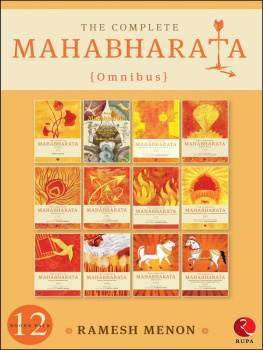
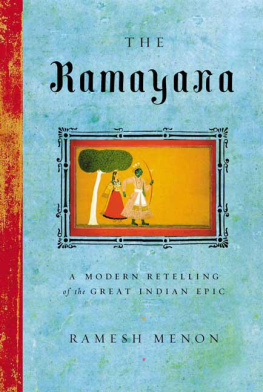
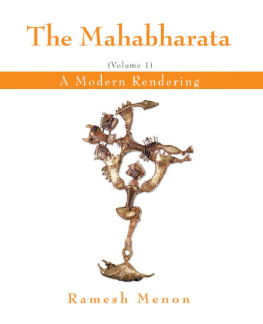
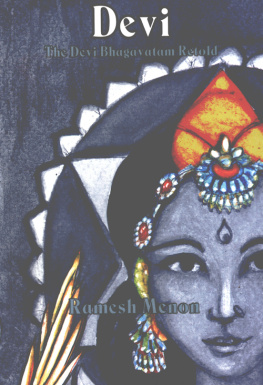
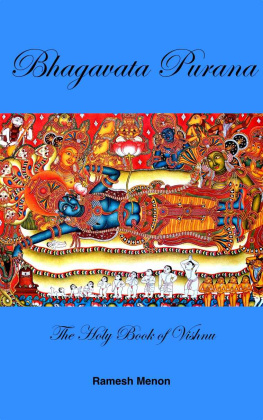
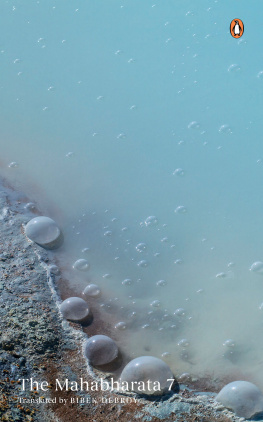
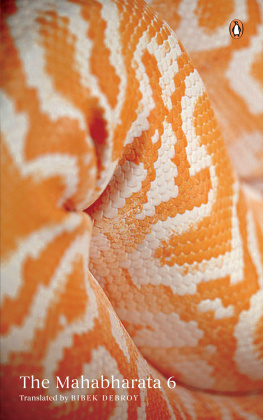
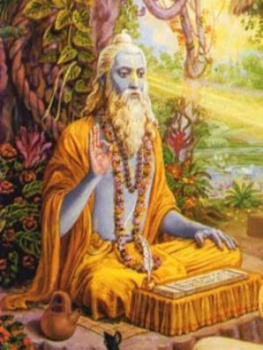
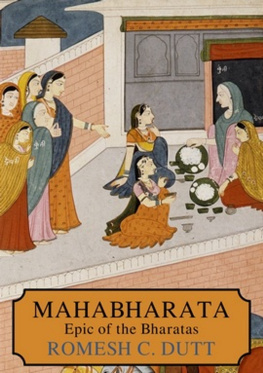
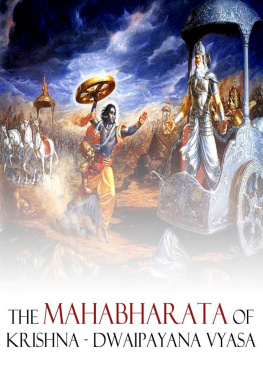
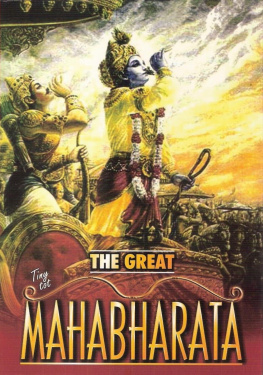

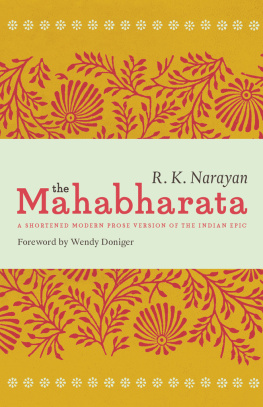
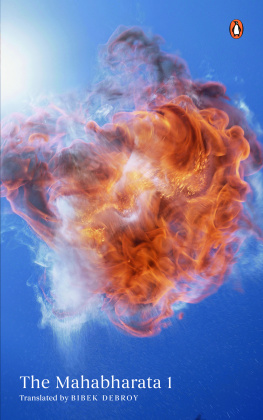
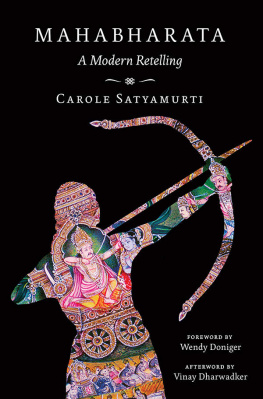



 UM! I bow down to Narayana and Nara, the most exalted Purusha, and to the Devi Saraswati, and utter the word Jaya. Ugrasrava is the son of Romaharshana; he is a Suta and a master of the Puranas. One day, bowing reverently, he came to the great Rishis of flinchless austerity who sat at their ease after attending the twelve years yagna of Saunaka Kulapati, in the Naimisha vana. The Munis were eager to listen to the marvellous legends of Ugrasrava, who had come to their asrama in the forest. The holy ones welcomed him with respect. He greeted those Sages with folded hands and inquired after the evolution of their tapasya.
UM! I bow down to Narayana and Nara, the most exalted Purusha, and to the Devi Saraswati, and utter the word Jaya. Ugrasrava is the son of Romaharshana; he is a Suta and a master of the Puranas. One day, bowing reverently, he came to the great Rishis of flinchless austerity who sat at their ease after attending the twelve years yagna of Saunaka Kulapati, in the Naimisha vana. The Munis were eager to listen to the marvellous legends of Ugrasrava, who had come to their asrama in the forest. The holy ones welcomed him with respect. He greeted those Sages with folded hands and inquired after the evolution of their tapasya.